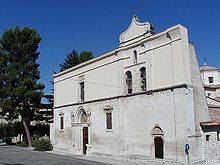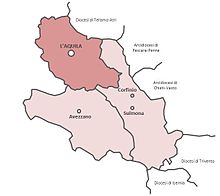Roman Catholic Diocese of Sulmona-Valva
|
Diocese of Sulmona-Valva Dioecesis Sulmonensis-Valvensis |
|
|---|---|

Sulmona Cathedral
|
|
| Location | |
| Country | Italy |
| Ecclesiastical province | L'Aquila |
| Statistics | |
| Area | 1,814 km2 (700 sq mi) |
| Population - Total - Catholics |
(as of 2010) 82,618 81,058 (98.1%) |
| Parishes | 76 |
| Information | |
| Denomination | Catholic Church |
| Rite | Roman Rite |
| Established | 6th Century |
| Cathedral | Basilica Cattedrale di S. Panfilo Vescovo (Sulmona) |
| Co-cathedral | Concattedrale di S. Pelino (Corfinio) |
| Current leadership | |
| Pope | Francis |
| Bishop | Angelo Spina |
| Emeritus Bishops | Giuseppe Di Falco |
| Map | |
 |
|
| Website | |
| www.diocesisulmona-valva.it | |
The Diocese of Sulmona-Valva (Latin: Dioecesis Sulmonensis-Valvensis) is a Roman Catholic ecclesiastical territory in central Italy, created in 1986. It is a suffragan of the Archdiocese of L'Aquila. The diocese was created in 1818 when the Diocese of Sulmona and the Diocese of Valva were united.
In the Lombard period Sulmona was subject to the Duchy of Spoleto; later it belonged to the counts of the Marsi. When the Normans conquered the Abruzzi, Sulmona increased in importance. Emperor Frederick II made it the capital of the "Gran Giustizierato" of the Abruzzi.
Legend associates the evangelization of the district with the name of Saint Britius, Bishop of Spoleto, in the second century. The first known Bishop of Sulmona is Palladius (499); in 503 a Fortunatus Valvensis is mentioned. Saint Pamphilus, Bishop of Valva, renowned for his sanctity and miracles, died about 706; he was buried in Sulmona Cathedral.
Four or five other bishops of Valva are known, but none of Sulmona until 1054, when Pope Leo IX named as Bishop of Valva, the Benedictine Domenico, and determined the limits of the Dioceses of San Pelino (Saint Pelinus) (i.e., Valva) and San Panfilo (Saint Pamphilus) (i.e., Sulmona), which were to have only one bishop, elected by the two chapters. Under Bishop Giacomo di Penne, a monk of Casa Nova (1252), it was arranged that the two chapters should unite in making the election, as frequent disputes had arisen when they acted separately.
...
Wikipedia
